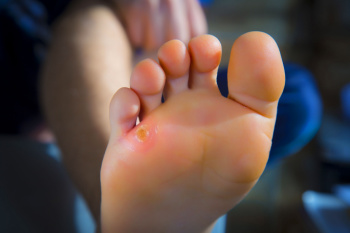 Corns are thickened areas of skin, usually on the toes or soles of the feet, that develop in response to pressure or friction. There are several different types of corns, each with its own distinct causes. Hard corns form on top of the toes or on bony areas due to repeated pressure or friction from improper footwear. In addition, foot deformities like bunions or hammertoes can contribute to corn formation that results from rubbing against the inside of a shoe. Soft corns commonly occur between the toes where the skin is moist and are often caused by friction from adjacent toes rubbing against each other. Seed corns are tiny corns that form in regions of the foot subjected to consistent weight-bearing. They are believed to be caused by dry skin or deformed sweat ducts. Regular exfoliation and moisturizing of the feet can help prevent dry skin and reduce the risk of seed corns. By participating in proper foot care practices, individuals can effectively manage corns and maintain optimal foot health. If you notice or struggle with corns forming on the foot, addressing the underlying cause of corns and treatment with a podiatrist is suggested.
Corns are thickened areas of skin, usually on the toes or soles of the feet, that develop in response to pressure or friction. There are several different types of corns, each with its own distinct causes. Hard corns form on top of the toes or on bony areas due to repeated pressure or friction from improper footwear. In addition, foot deformities like bunions or hammertoes can contribute to corn formation that results from rubbing against the inside of a shoe. Soft corns commonly occur between the toes where the skin is moist and are often caused by friction from adjacent toes rubbing against each other. Seed corns are tiny corns that form in regions of the foot subjected to consistent weight-bearing. They are believed to be caused by dry skin or deformed sweat ducts. Regular exfoliation and moisturizing of the feet can help prevent dry skin and reduce the risk of seed corns. By participating in proper foot care practices, individuals can effectively manage corns and maintain optimal foot health. If you notice or struggle with corns forming on the foot, addressing the underlying cause of corns and treatment with a podiatrist is suggested.
If you have any concerns regarding your feet and ankles, contact one of our podiatrists of Waterbury Podiatry Consultants. Our doctors will treat your foot and ankle needs.
Corns: What Are They? and How Do You Get Rid of Them?
Corns can be described as areas of the skin that have thickened to the point of becoming painful or irritating. They are often layers and layers of the skin that have become dry and rough, and are normally smaller than calluses.
Ways to Prevent Corns
There are many ways to get rid of painful corns such as wearing:
- Well-fitting socks
- Comfortable shoes that are not tight around your foot
- Shoes that offer support
Treating Corns
Treatment of corns involves removing the dead skin that has built up in the specific area of the foot. Consult with Our doctors to determine the best treatment option for your case of corns.
If you have any questions please feel free to contact our offices located in Waterbury and Southington, CT . We offer the newest diagnostic and treatment technologies for all your foot and ankle needs.
